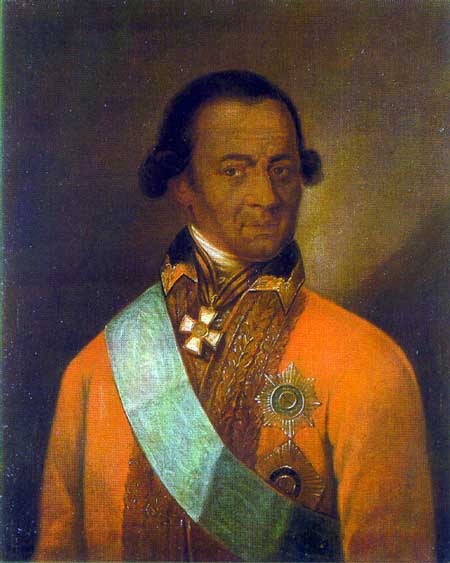Difference between revisions of "Abram Petrovich Hannibal and Adoption"
m (→References) |
|||
| (One intermediate revision by the same user not shown) | |||
| Line 11: | Line 11: | ||
==References== | ==References== | ||
The Life of Alexander Pushkin, edited by Betram A. Fitzgerald, Jr. (Dix Hills: Fitzgerald Pub. Co., 1972) (Golden Legacy series) | The Life of Alexander Pushkin, edited by Betram A. Fitzgerald, Jr. (Dix Hills: Fitzgerald Pub. Co., 1972) (Golden Legacy series) | ||
| − | "The Blurred Racial Lines of Famous Families: Pushkin [[Genealogy]]." [Includes portrait]. Available at: | + | "The Blurred Racial Lines of Famous Families: Pushkin [[Genealogy]]." [Includes portrait]. Available at: www.pbs.org/wgbh/pages/frontline/shows/secret/famous/pushkingenealogy.html |
| − | Wilson, F. "Abraham (Ibrahim) Hannibal." Available at: | + | Wilson, F. "Abraham (Ibrahim) Hannibal." Available at: www.afrinet.net/~hallh/afrotalk/afrodec94/0795.html |
| − | Blakely, Allison. "Problems in Studying the Role of Blacks in Europe." Formerly available at: | + | Blakely, Allison. "Problems in Studying the Role of Blacks in Europe." Formerly available at: chnm.gmu.edu/aha/persp/tin/blakely597.html |
Uglow, Jenny. "Educating Sabrina," The Guardian [London], Review Section, 5 October 2002, pp. 34-35 (based on part of her book The Lunar Men: The Friends Who Made the Future, 1730-1810. (London: Faber, 2002) | Uglow, Jenny. "Educating Sabrina," The Guardian [London], Review Section, 5 October 2002, pp. 34-35 (based on part of her book The Lunar Men: The Friends Who Made the Future, 1730-1810. (London: Faber, 2002) | ||
Latest revision as of 03:36, 24 February 2018
Biography
Hannibal was born an African prince, but kidnapped as a young boy about 1692 and sent to Istanbul as a hostage. A year late he was sent as a present to Tsar Peter of Russia, who used him as an experiment to demonstrate his educational theories. He was a brilliant student and soon became a favorite of the tsar, who had him baptized and gave him the names Petrovitch (after himself) and Hannibal (after the African Roman general).
He became a fine general and engineer and was appointed tutor to the crown prince, but after Peter's death court jealousies led to him being sent to Siberia on increasingly unimportant jobs. Eventually he was arrested and imprisoned. The tsarina Anna Ivanova rescued him and not only restored his position at court but made him engineer general of Russia and awarded him the Alexander Nevski Medal. He died a wealthy and revered man, leaving a wife and nine children, one of whom was the grandfather of Alexander Pushkin.
Hannibal was not the only victim of experiments by rich dilettante followers of modern romantic education. The Englishman Thomas Day, influenced by Jean-Jacques Rousseau, decided to create his own wife. In the late 1760s he adopted two unrelated orphans or foundlings, whom he named Sabrina Sidney and Lucretia, then aged 11 and 12. He spent the next few years trying to mold them into his ideal wife, with the intention of marrying the more satisfactory result and marrying off the other with a good dowry. He moved with them to France for eight unhappy months. After returning, he gave up on Lucretia and apprenticed her to a milliner. She later married and received her dowry. He persisted with Sabrina for a short while longer, then gave up on her as well and packed her off to a boarding school. He eventually married someone else.
These experiments remind one of George Bernard Shaw's play Pygmalion, later made into the musical comedy My Fair Lady.
References
The Life of Alexander Pushkin, edited by Betram A. Fitzgerald, Jr. (Dix Hills: Fitzgerald Pub. Co., 1972) (Golden Legacy series) "The Blurred Racial Lines of Famous Families: Pushkin Genealogy." [Includes portrait]. Available at: www.pbs.org/wgbh/pages/frontline/shows/secret/famous/pushkingenealogy.html Wilson, F. "Abraham (Ibrahim) Hannibal." Available at: www.afrinet.net/~hallh/afrotalk/afrodec94/0795.html Blakely, Allison. "Problems in Studying the Role of Blacks in Europe." Formerly available at: chnm.gmu.edu/aha/persp/tin/blakely597.html Uglow, Jenny. "Educating Sabrina," The Guardian [London], Review Section, 5 October 2002, pp. 34-35 (based on part of her book The Lunar Men: The Friends Who Made the Future, 1730-1810. (London: Faber, 2002)
- Adoption Celebrities
- Adopted Persons
- 18th Century
- African
- Russia
- Education, Teaching, Libraries
- Engineering, Technology, Aviation, Inventions
- Military and Defense
- Exile or Persecution (religious, Political or Social)
- To Provide Heirs, As Protégés, etc.
- Captured by Another Tribe or Group
- Slaves
- Priest, Religious, Teacher, Coach, Mentor, Patron, Apprentice Master or Owner
- Others ("Strangers")
- Wealthy, Famous, Noble or Divine Adoptive or Foster Families
- Trans-Racial, Trans-Tribal, International or Trans-Cultural Adoption or Fostering
- Customary or Traditional Adoption, Informal and Extra-Legal Care
- Adoptees/Fosterees from Wealthy, Famous, Noble or Divine Birth Families
- Tracing Impossible or Birth Family Extinct
